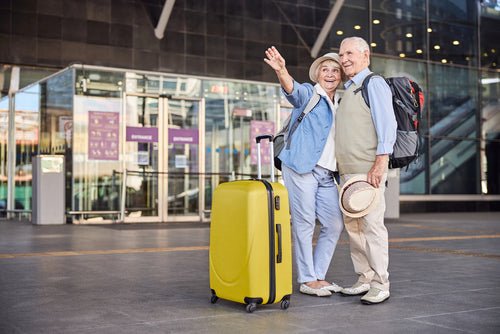
6 Travel Tips for Seniors
Travelling as you get older can prove to be more challenging, but it doesn’t have to be any less fun!
Although you may have to clear space in your suitcase for medication or living aids, the experience can be just as enriching and adventurous as when you were younger.
So, whether you’re jetting off on a city break or relaxing on an island, we’ve put together a guide to the best travel tips for seniors to ensure a safe and memorable journey.
1. Plan for a Smooth Journey
Planning ahead is key to experiencing a smooth and stress-free journey:
Research your destination
Before you pack, check the weather forecast to know what clothes to bring and include an extra few items in your luggage to account for weather changes or emergencies.
Familiarise yourself with the local culture and cuisine so you know what to expect and can plan for dietary requirements and allergies. Look for information on accessibility features such as ramps and elevators to find accessible tourist attractions and accommodations.
Medical preparations
Before you go abroad, book an appointment with your doctor for a health check and any advice for managing health conditions on holiday.
Make sure you stock up on your medication so you don’t run out during your trip, and use a pill organiser to separate your tablets. Check whether your health insurance covers you while abroad and buy supplemental travel health insurance if not.
Travel Insurance
Choose comprehensive travel insurance that covers all situations, including cancellations, lost luggage, medical emergencies, and travel interruptions.
You can find insurance tailored for seniors that covers pre-existing conditions and related emergencies.
2. Packing Smart for Comfort and Convenience
When packing for your trip abroad, ensure that you include the following essential items:
- Vital documents (passport, ID, travel insurance, flight tickets, list of emergency contacts, and hotel reservations)
- Lightweight clothes for warm destinations
- Warmer layers for colder climates
- Supportive and comfortable shoes (wide shoes for arthritis)
- Mini first aid kit (bandages, pain relief, glucose meter, pressure monitor)
- Portable chargers
- Travel pillow and blanket
- Toiletries and hygiene products
Use packing cubes to separate your items into neat sections for easier access and extra storage space.
3. Navigating Airports and Flights
If you require a wheelchair, many airports provide wheelchair services and guided assistance through security and boarding.
To access this, contact the airport beforehand and request these services in advance. If you use a mobility aid, such as a walker or walking stick, check the policies for these items with the airports you’re flying to and from.
If you require extra space on the plane or need a specific seat, contact the airline directly to ask for these accommodations to be made. Consider investing in a swivel cushion for help with sitting and standing on the plane.
4. Accommodations and Accessibility
When searching for accommodation, use websites such as Booking.com and TripAdvisor so you can filter your search for accessibility-friendly hotels. Hotel chains are commonly more inclusive.
Always read the reviews before you book your stay. When choosing your room, look for grab bars, walk-in showers, and wider doorways for wheelchairs.
Contact the hotel directly to request ground floor rooms and extra pillows or to alert them of any dietary requirements beforehand.
5. Staying Healthy and Safe
When travelling, always make sure you have a bottle of water on you to stay hydrated, and you include fruit, vegetables, and protein in your diet.
If you have diabetes, ensure to pack sugary snacks for when your blood sugar is low. Before travelling, make sure you’re up to date on any vaccinations and bring a copy of your prescriptions abroad with you.
If you’re feeling anxious or overwhelmed, practice stress-relieving techniques, such as meditation, breathwork, and journaling. Keep your family regularly updated on your safety. This can also reduce feelings of isolation if you’re travelling alone.
6. Enjoying the Experience
If you struggle with limited mobility or respiratory conditions, remember to take it slow and plan out a manageable itinerary beforehand.
Get involved in local tours for guidance when sightseeing, and incorporate some relaxing activities, such as scenic walks and spas, to remain calm and collected.
Don’t forget to take as many pictures as you can to capture the memories or create a travel journey to look back on each trip!
Invest in Travel Aids with Millercare
At Millercare, we understand how important it is to stay comfortable and supported while travelling.
Whether you live with a disability or have limited mobility due to age, we have a range of foldable walking aids, pillows, and lightweight wheelchairs to assist you on your journey.
You deserve to see the world while ensuring your comfort and safety.